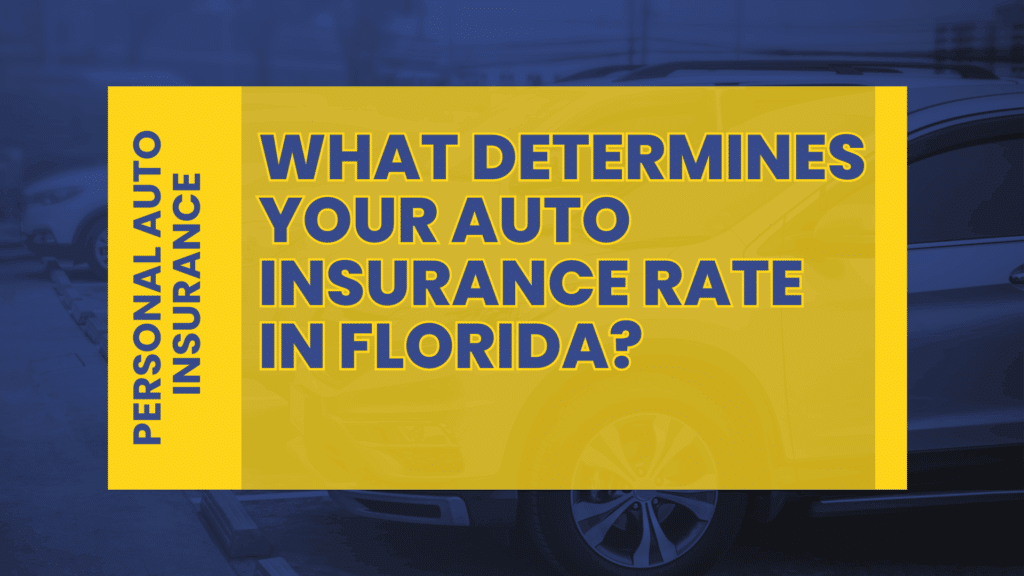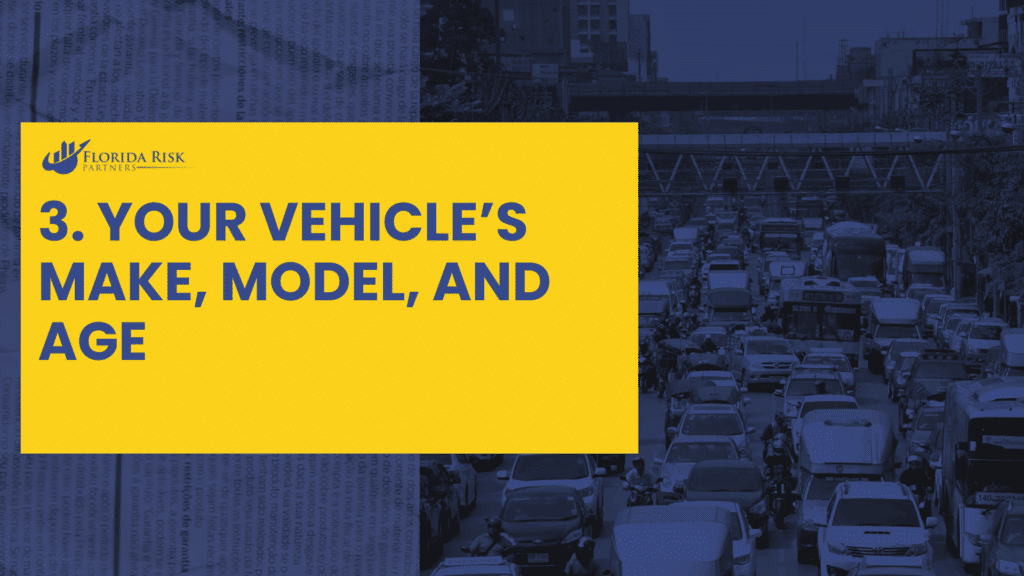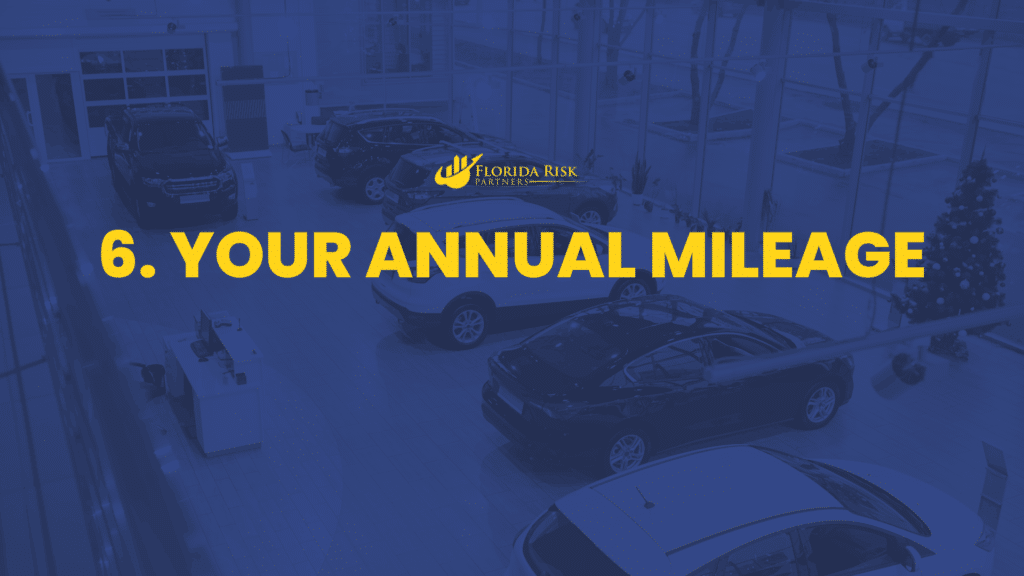-
Main Office: 1434 E. Bloomingdale Ave Valrico, FL 33596-6110
-
Phone: (888) 601-6660
-
Email: info@floridariskpartners.com

7 Key Factors That Affect What You Pay (and What You Can Do About Them)
If you’re like most drivers in Florida, you’ve probably wondered why your auto insurance rate seems higher than expected—or why it changes at renewal, even if you haven’t filed a claim. The truth is, auto insurance premiums in Florida are influenced by a mix of personal, vehicle-specific, and external factors.
In this article, we’ll explain the top seven rating factors insurance companies use when calculating your premium and give you tips on how to manage the ones you can control. The more you understand what drives your rate, the better equipped you’ll be to make smart insurance decisions.
1. Your Driving Record
It should come as no surprise that your driving history is one of the most important factors in determining your insurance premium. If you’ve had a clean record over the past 3 to 5 years—no speeding tickets, accidents, or DUIs—you’ll likely qualify for safe driver discounts.
But even a minor violation can cause your rate to jump. For example, a single speeding ticket in Florida can increase your premium by 16% or more. More serious offenses, like reckless driving or a DUI, can lead to much higher surcharges and may even require you to purchase high-risk insurance or an FR-44 filing.
Want to avoid rate hikes due to violations? Read our guide to how accidents and tickets affect your premium.
2. Your Location
Where you live in Florida plays a significant role in how much you pay for car insurance. Urban areas like Miami, Tampa, and Orlando typically have higher rates due to increased traffic congestion, higher accident rates, and more claims for theft or vandalism.
Rural or suburban areas, on the other hand, tend to have lower premiums. This is because the risk of accidents, theft, and litigation is lower. Even your ZIP code can make a difference, so moving just a few miles can impact your rate.
3. Your Vehicle’s Make, Model, and Age

Not all cars cost the same to insure. Vehicles that are more expensive to repair or more likely to be stolen usually come with higher premiums. For instance, luxury cars and newer models with advanced tech features often cost more to fix, which means higher claims payouts—and that translates to higher rates.
On the other hand, older vehicles or cars with strong safety and reliability records can lower your costs. Additionally, vehicles with anti-theft devices or high safety ratings may qualify for discounts from some insurers.
4. Your Age and Driving Experience
Statistically speaking, younger and less experienced drivers are more likely to be involved in accidents, which makes them more expensive to insure. That’s why drivers under 25 in Florida often pay the highest rates.
On the flip side, mature drivers with decades of experience—and no major violations—usually enjoy some of the lowest premiums. That said, drivers over age 70 may see rates begin to rise again as insurers account for potential slower reaction times and increased risk on the road.
5. Your Credit Score
This one surprises a lot of people: In Florida, your credit score can significantly impact your car insurance premium. Insurance companies use a “credit-based insurance score” to help predict the likelihood of filing a claim.
Drivers with poor credit may pay up to twice as much as those with good credit, even if they have identical driving records. If your score has recently improved, it’s worth checking with your insurer to see if you’re eligible for a lower rate.
Want to learn more about how Florida insurers use credit scores? Read our full breakdown on credit and car insurance.
6. Your Annual Mileage

How much you drive also affects your rate. The more time you spend on the road, the greater your chance of being involved in an accident. If you have a long daily commute or frequently travel by car, insurers may see you as a higher risk.
On the other hand, low-mileage drivers may qualify for discounts, especially through usage-based programs. If you now work from home or have cut back your driving, let your insurer know—you may be eligible for savings.
7. Your Chosen Coverages and Deductibles
Last but not least, your insurance policy choices impact your rate directly. Opting for higher liability limits, adding comprehensive and collision coverage, or including extras like roadside assistance will increase your premium—but they also provide better protection.
Conversely, if you choose higher deductibles, your monthly premium will typically decrease. Just be sure you can afford the out-of-pocket costs in the event of a claim.
Looking to build the right coverage plan? Check out our guide to choosing auto insurance in Florida.
What You Can Control (and What You Can’t)
Some factors—like your age or your ZIP code—are out of your hands. But others, like your driving record, credit score, and coverage choices, give you opportunities to reduce your rate with a little planning.
Here’s what you can start doing today:
- Maintain a clean driving record
- Check your credit score and work to improve it
- Review your current coverage and consider raising your deductible
- Explore safe driver and low mileage discounts
- Shop around annually for better rates (especially if your risk profile improves)
Need help evaluating your policy? Schedule a free Florida auto insurance review and let our team help you identify savings opportunities tailored to your situation.
Coming Next Week: 10 Ways to Save on Car Insurance in Florida
Don’t miss next week’s post, where we’ll dive into 10 proven tips to lower your car insurance premium without sacrificing coverage. These are the same strategies smart Florida drivers use to keep more money in their pocket—without taking on unnecessary risk.
Call Us Or
Schedule an Appointment
Select an agent below to view our online calendars and select a day and time that works best for you or call us directly at 888-601-6660. When you use our online calendars, you will receive an email with more information.



